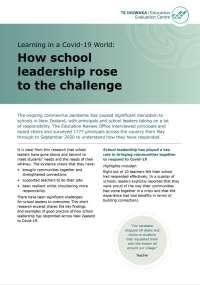Teaching strategies that work - Reading
Published: 14 May 2018
The Education Review Office (ERO) has released the latest in its Teaching Strategies that Work series. “Keeping children engaged and achieving in reading” is a description of strategies used by primary schools which have significantly improved their students’ achievement in reading.
- Audience:
- Education
- Schools
- Content type:
- Research
- Topics:
- Reading
- Engagement
- Programme for International Student Assessment (PISA)
- National Monitoring Study of Student Achievement (NMSSA)
- Accelerated learning






